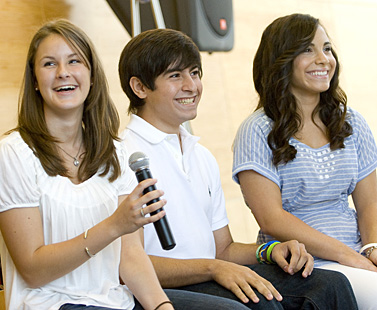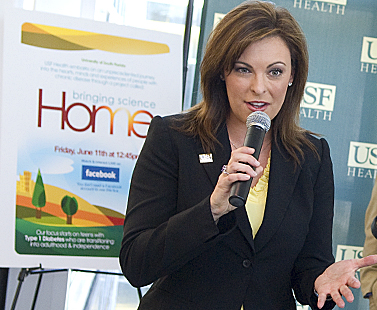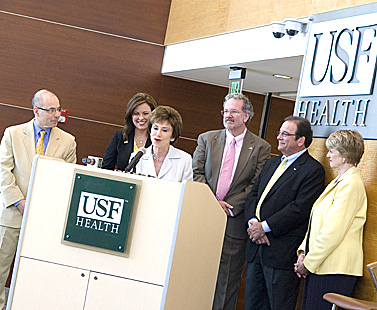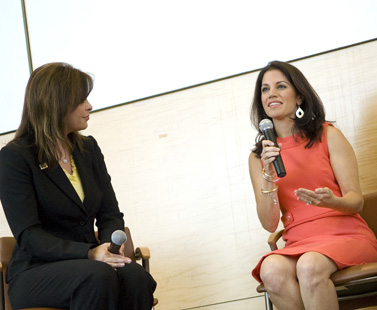Bringing Science Home: transforming life with diabetes

Members of the teen advisory board for Bringing Science Home address the crowd at Friday’s announcement. L to R: Liz Giles, Robert Colon, Laura Bernstein
For Alysia Ekizian, the benefits of USF Health’s newest project, Bringing Science Home, have already begun – even though the project officially kicked off Friday.
“If you had to have diabetes, this is what you want,” Ekezian said. “You want to give your child a voice.”
A voice, she said, and a community.
That’s what Ekizian’s daughter, Melanie, has found as a member of Bringing Science Home’s teen advisory board. Melanie is no longer the only one with Type 1 diabetes. She knows others with the same challenges, the same struggles.
Ultimately, the Ekizians believe that will help Melanie live with her diabetes – and they want Bringing Science Home to do the same for other teens with Type 1 diabetes.
That’s also the goal of Nicole Johnson, executive director of Bringing Science Home.
“This project is going to change people’s lives,” she said at Friday’s announcement.

Nicole Johnson, executive director of Bringing Science Home, introduces the project.
Thanks to a $5.66 million gift from The Patterson Foundation, part of the USF System’s $600-million USF:Unstoppable Campaign, Bringing Science Home will work to help people with chronic diseases live fuller and more optimistic lives. The project will start by studying the lives of people with Type 1 diabetes and helping young people with the transition of caring for their diabetes more independently.
Johnson knows that struggle firsthand. After she was diagnosed with diabetes at 19, she was told that many of her life goals were now out of reach. Fortunately, she didn’t listen. She went on to become Miss America 1999, to complete two master’s degrees, and now juggles her career in diabetes advocacy with being a mother.
But she wants to be sure young people diagnosed today get a different message.
“They can accomplish whatever they want,” Johnson said. ”And their condition is just along for the ride.”

USF President Judy Genshaft signed the gift agreement Friday.
USF officials said Friday they have high hopes for Bringing Science Home.
“I want to thank The Patterson Foundation for their generous gift and for making a difference,” said President Judy Genshaft. “This project aims to change the model of chronic disease education and care.”

Dr. Stephen Klasko, dean of the USF College of Medicine and CEO of USF Health, addresses the group.
Dr. Stephen Klasko, CEO of USF Health and dean of the College of Medicine, also thanked The Patterson Foundation, a non-profit organization based in Sarasota.
“It’s almost like a match.com of philosophies,” he said of Patterson, “When both of us feel that with the right partnership, why shouldn’t we lead the health care revolution?”

Debra Jacobs, president and CEO of The Patterson Foundation, talks about joining forces with USF Health.
Debra Jacobs, president and CEO of the foundation, said that when Patterson became interested in pursuing a diabetes initiative, USF was a natural choice.
“We wanted to find a transformational partner,” she said. “Frankly, it starts at the top. Judy Genshaft lives in the world of possibilities.”
For the teen advisory board members and their parents, living with diabetes is a daily challenge.
“It’s a constant education. …You have to teach yourself,” said Robert Colon, 16, who was diagnosed just three months ago. “There’s no textbook on how to live with diabetes.”
Nor does that education ever stop.
“It doesn’t wait for you,” said Liz Giles, 18, a rising sophomore at the University of Tampa. “You can be on a dinner date or out with friends and you have to put everything on pause and deal with your diabetes.”
That’s one reason these teens hope that Bringing Science Home will help people with diabetes cope with their daily challenges.
“It means a lot to me that this is coming together,” said Carly Stagg, 14. “I feel like it’s going to treat the whole person with diabetes instead of just doctor visits or just the emotional side.”

Bringing Science Home shapes a community.
It also gives them something else: each other.
“It’s comforting to have all the support of other people,” said Laura Bernstein, 16.
“It helps you feel more comfortable around other people when you have people who know what you’re going through,” said Melanie Ekizian.

Alysia Ekizian talks with Nicole Johnson about the challenges of diabetes.
Ultimately, Alysia Ekizian said, the teens are role models for each other, helping each other deal with their disease in a more positive way.
“It’s a mentality shared by the other kids – not ‘I’m a diabetic’ but ‘I’m a kid who happens to have diabetes,’ ‘’ she said. “This is laying the foundation for them to be able to take care of themselves and to learn they can impact the future.”
— Story by Lisa Greene, photos by Eric Younghans, USF Health Communications


